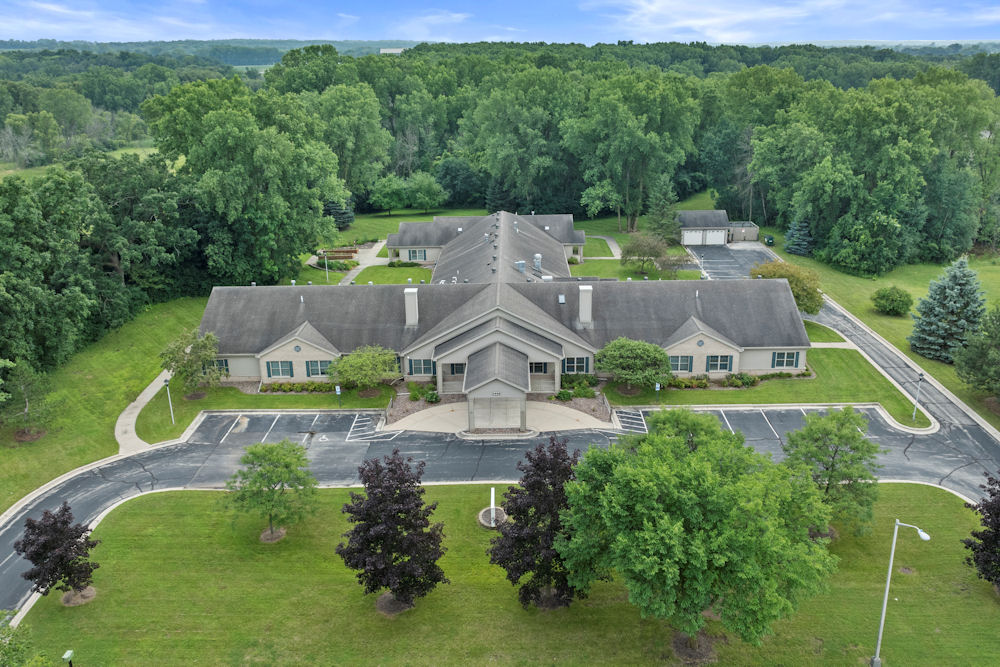
Wisconsin Recovery Institute
Wisconsin Recovery Institute is located in peaceful and delightful Fond du Lac and offers an engaging treatment experience. Our licensed dual-diagnosis drug rehab in Wisconsin offers detox, residential, and outpatient services to help individuals find freedom from addiction. The Midwest charm of our facility creates a safe haven that promotes healing, warmth, and recovery.
ADDICTION TREATMENT IN WISCONSIN
Drug and Alcohol Detox
Drug and alcohol detox is the initial phase in the recovery process. Our detox program at Wisconsin Recovery Institute helps remove the substances safely from the body.
Residential Treatment
Our residential treatment centers in Wisconsin offer around-the-clock care and support for those struggling with drug and alcohol addiction. This type of program is well suited for individuals requiring intensive support.
Dual Diagnosis Treatment
Wisconsin Recovery Institute understands the complexity of substance abuse issues being intertwined with mental health challenges. Our dual diagnosis program acknowledges the interconnected nature of these conditions and provides comprehensive care to individuals facing this challenge.
Therapy
We offer a range of therapy programs for individuals struggling with substance abuse. Our therapy programs are tailored to the unique needs of the client, creating a well-rounded and effective foundation for clients seeking lasting recovery.
Individual Case Management
Wisconsin Recovery Institute offers individual case management for addiction for clients struggling with complex needs such as co-occurring disorders. This therapy program involves a dedicated case manager overseeing and coordinating a personalized recovery plan for the client.
Drug and alcohol detox is the initial phase in the recovery process. Our detox program at Wisconsin Recovery Institute helps remove the substances safely from the body.
Our residential treatment centers in Wisconsin offer around-the-clock care and support for those struggling with drug and alcohol addiction. This type of program is well suited for individuals requiring intensive support.
Wisconsin Recovery Institute understands the complexity of substance abuse issues being intertwined with mental health challenges. Our dual diagnosis program acknowledges the interconnected nature of these conditions and provides comprehensive care to individuals facing this challenge.
We offer a range of therapy programs for individuals struggling with substance abuse. Our therapy programs are tailored to the unique needs of the client, creating a well-rounded and effective foundation for clients seeking lasting recovery.
Wisconsin Recovery Institute offers individual case management for addiction for clients struggling with complex needs such as co-occurring disorders. This therapy program involves a dedicated case manager overseeing and coordinating a personalized recovery plan for the client.
Alcohol and Drug Rehab in Wisconsin
Our comprehensive alcohol and drug rehab programs are designed to tackle addiction to various substances, including but not limited to:
Alcohol Addiction Treatment
Alcohol addiction, or alcoholism, is a chronic disease characterized by the inability to control or stop drinking despite negative consequences. Our tailored programs address the physical and psychological aspects of alcohol dependence.
Opioid Addiction Treatment
Opioid addiction involves the misuse of prescription painkillers or illicit substances like heroin. Our evidence-based treatments focus on managing withdrawal symptoms, preventing relapse, and promoting overall recovery.
Stimulants
Addiction to stimulants, such as cocaine or methamphetamine, can have profound effects on both physical and mental health. Our programs incorporate strategies to address the unique challenges associated with stimulant use disorders.
Benzodiazepines
Dependence on prescription drugs like benzodiazepines, commonly prescribed for anxiety or sleep disorders, requires careful management to navigate withdrawal symptoms and develop effective coping mechanisms.
Marijuana Addiction Treatment
While often perceived as less harmful, cannabis addiction can impact daily functioning. Our programs provide support for individuals looking to overcome dependence on marijuana and build a foundation for lasting recovery.
Hallucinogens
Addiction to hallucinogenic substances like LSD or psilocybin mushrooms requires specialized care to address the psychological aspects of dependence and promote a substance-free lifestyle.
At Wisconsin Recovery Institute, we understand that each substance use disorder is unique, and our dedicated team is committed to tailoring treatment plans to meet the specific needs of individuals struggling with addiction. Our goal is to provide a supportive and comprehensive environment that fosters lasting recovery from a variety of substances.
Dual Diagnosis Treatment Options We Offer
Anxiety and Addiction
Anxiety and addiction can often feed into each other. For example, anxiety can lead to self-medication with substances, while substance abuse can exacerbate anxiety symptoms. Our dual diagnosis approach recognizes the complexity of these issues and provides comprehensive care.
Depression and Addiction
Depression and addiction often go hand-in-hand, creating a complex cycle that can be difficult to break. For example, substance abuse can exacerbate depressive symptoms while depression can lead to self-medication with substances. Our dual diagnosis approach provides comprehensive care and recognizes the complexity of these issues.
PTSD and Addiction
Post-Traumatic Stress Disorder (PTSD) and addiction can form a complex and debilitating cycle. PTSD can lead to self-medication with substances as a way to cope with distressing symptoms. Conversely, substance abuse can exacerbate PTSD symptoms and make it more difficult to manage trauma-related experiences. Our dual diagnosis approach recognizes the interconnectedness of these conditions and provides comprehensive care.
ADHD and Addiction
ADHD and addiction can often coexist, creating a complex cycle that can be difficult to manage. ADHD can contribute to impulsive behavior and difficulty delaying gratification, making individuals more susceptible to substance abuse. Conversely, substance abuse can exacerbate ADHD symptoms and make it more difficult to manage daily challenges. Our dual diagnosis approach provides comprehensive care and recognizes the interconnectedness of these conditions.
Bipolar Disorder and Addiction
Bipolar disorder and addiction often coexist, creating a complex cycle that can be difficult to manage. Bipolar disorder can lead to impulsive behavior and mood swings, making individuals more susceptible to substance abuse. Conversely, substance abuse can exacerbate bipolar disorder symptoms and make it more difficult to manage mood fluctuations. A dual diagnosis approach provides comprehensive care and recognizes the interconnectedness of these conditions.
Dual Diagnosis Treatment Options We Offer
Anxiety and addiction can often feed into each other. For example, anxiety can lead to self-medication with substances, while substance abuse can exacerbate anxiety symptoms. Our dual diagnosis approach recognizes the complexity of these issues and provides comprehensive care.
Depression and addiction often go hand-in-hand, creating a complex cycle that can be difficult to break. For example, substance abuse can exacerbate depressive symptoms while depression can lead to self-medication with substances. Our dual diagnosis approach provides comprehensive care and recognizes the complexity of these issues.
Post-Traumatic Stress Disorder (PTSD) and addiction can form a complex and debilitating cycle. PTSD can lead to self-medication with substances as a way to cope with distressing symptoms. Conversely, substance abuse can exacerbate PTSD symptoms and make it more difficult to manage trauma-related experiences. Our dual diagnosis approach recognizes the interconnectedness of these conditions and provides comprehensive care.
ADHD and addiction can often coexist, creating a complex cycle that can be difficult to manage. ADHD can contribute to impulsive behavior and difficulty delaying gratification, making individuals more susceptible to substance abuse. Conversely, substance abuse can exacerbate ADHD symptoms and make it more difficult to manage daily challenges. Our dual diagnosis approach provides comprehensive care and recognizes the interconnectedness of these conditions.
Bipolar disorder and addiction often coexist, creating a complex cycle that can be difficult to manage. Bipolar disorder can lead to impulsive behavior and mood swings, making individuals more susceptible to substance abuse. Conversely, substance abuse can exacerbate bipolar disorder symptoms and make it more difficult to manage mood fluctuations. A dual diagnosis approach provides comprehensive care and recognizes the interconnectedness of these conditions.
Latest From Wisconsin Recovery Institute
Many people don't recognize agitated depression because it doesn't match the common image of someone who's depressed.
You're taking your antidepressant every day like you're supposed to, but you still feel stuck. Maybe you're wondering if the medication is even working, or if something's wrong with you.
So you're trying to figure out whether you or someone you care about might have borderline personality disorder or bipolar disorder.
Contact Wisconsin Recovery Institute
For Help with Addiction
Our addiction rehab in Fond du Lac, WI, provides a comfortable environment to heal among peers and a very dedicated staff. We offer a full continuum of care for those recovering from drug or alcohol abuse. If you need help, give us a call and learn how to get started on your recovery with Wisconsin Recovery Institute.










